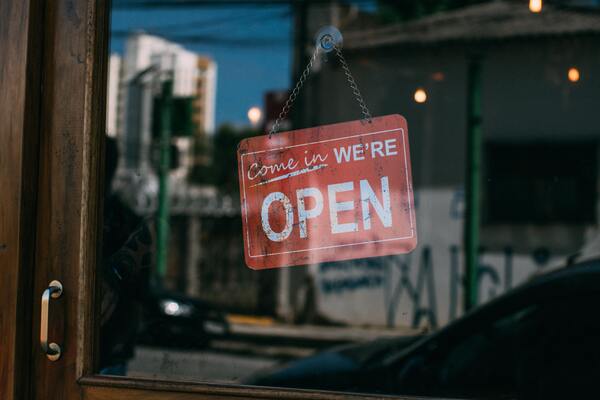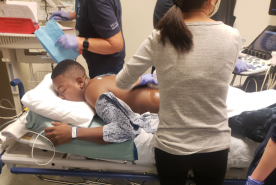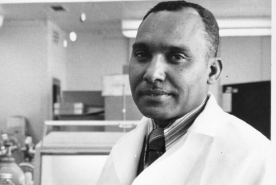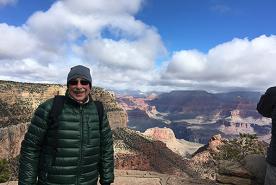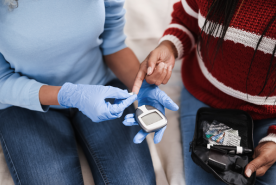April 23, 2020
By Kevin Longino, CEO of National Kidney Foundation and kidney transplant patient
As the nation begins to see progress in our fight against COVID-19, some states will slowly begin opening but what does that mean for kidney patients? How can we ensure they are getting everything they need?
A slow opening
As states start to transition to slowly opening over the next few months, we may start to see a sense of normalcy. One of these changes will mean that elective surgeries start to move forward. But, it’s important to recognize that not all “elective” surgeries are created equal. There are some procedures deemed “elective”, like vascular access procedures, which are life-critical and those should take priority.
For dialysis patients, vascular access procedures are essential. When a patient is on dialysis, a central venous catheter is inserted into a major vein until a fistula or graft is placed in the arm vessels and ready for long-term use. These temporary catheters often need to be changed due to infection or other complications. While these procedures are done on an outpatient basis, they are still considered surgical procedures. Placement of long-term vascular accesses, including fistulas, grafts and peritoneal dialysis catheters placed in the abdomen, cannot be delayed and neither can surgeries needed to correct any complications related to these accesses. With a potential glut of “non-essential” surgeries waiting to take place, delays in placement of hemodialysis vascular access or peritoneal dialysis catheters will only increase the risk for hospitalizations, blood stream infections and death for this very vulnerable population and we urge hospitals to give them priority in the queue.
Urging the MACs to do more
Many patients have been reaching out to us indicating they’re having a hard time securing greater than 30-day supplies of immunosuppressive drugs that transplant patients take daily. This is problematic because we don’t want patients to have to go back-and-forth to the pharmacy and increase their risk of coming in contact with someone infected by coronavirus. But, it’s also because the Centers for Medicare and Medicaid Services (CMS) have already said extending prescriptions for a drug that is reasonable and necessary is allowed. In a series of letters sent this week to the nation’s Medicare Administrative Contractors (MACs), which manage the day-to-day operations of the Medicare program, NKF advocated that they allow kidney patients to receive 90-day supplies of their Part B drugs. This extended supply permits a transplant patient, who is at an increased risk for developing life-threatening complications from COVID-19, to reduce the number of visits to pharmacies and hospitals and ensure an uninterrupted supply of these life-saving medications.
NKF also requested the MACs exercise their authority to pay for ground ambulance transportation for end stage renal disease (ESRD) patients. And right now, we’re tracking reports of patients being denied access to non-emergency medical transport through their state Medicaid program if they are positive with coronavirus or have any respiratory symptoms. While this affects only a small number of dialysis patients, having access to ground ambulance transport to dialysis appointments can be lifesaving. As a result of our outreach, we have already heard from several of the MACs which are revisiting their polices so that patients can get to their dialysis appointments and receive their necessary treatments. We’re making similar requests to private and commercial insurers as well.
Donating life during a pandemic
April is Donate Life month, a chance to recognize the importance of deceased and living organ donation in saving the lives of fellow Americans. I’m one of those Americans here today only because a family, during their extreme grief, saw fit to donate their loved one’s organs and save my life. I’m proud to say that I have recently joined the Board of Directors of Donate Life America and continue with a long tradition of NKF’s collaboration with this outstanding organization. NKF has been involved with Donate Life America from the very beginning. We were a founding member of Donate Life America (then called the Coalition on Donation) when it was first formed in 1992 and we’ve worked with the Donate Life America community since that time, including through the development of educational resources on living donation and serving on their Advisory Committee. I look forward to helping expand awareness of living and deceased organ donation so that anyone who wants a transplant has a chance to receive one.
Donating life-saving organs during the pandemic has unfortunately been a challenge. As we know too well, transplants are an opportunity that often cannot be regained once lost. While NKF worked closely with the federal government to classify transplantation as an essential surgery allowed during the pandemic, the number of transplants has still fallen compared to previous years, mostly due to a decline in living donor transplants. We recognize that our healthcare system had to give COVID-19 precedence; however, as the federal government considers the best path forward for reopening the nation, we’re making the case that hospitals should prioritize transplants while continuing to protect recipients and living donors from ongoing COVID-19 risks.
Kidney patients may be concerned about having a transplant and becoming immune suppressed during the pandemic. To address these fears, NKF is hosting a live Q&A webinar (also available as a Facebook Live) with renowned transplant nephrologist, Dr. Anil Chandraker, to discuss precautions and considerations for transplant recipients and living donors alike. Ask questions in real time as he discusses the latest updates on how COVID-19 is affecting transplant surgeries.
New patient series
Finally, as a patient I’m always looking for more information that can help me manage my disease. Typically, NKF hosts in-person educational workshops to keep our patients nationwide up to date with the very latest on kidney disease. We’ve converted these to a virtual format so that our patients can still stay connected. On May 2nd, NKF is launching a new Virtual Education Series: Connect, Learn and Share. Health experts and kidney patients will share information and resources for people at all stages of kidney disease including topics like telemedicine, transplantation, kidney-friendly eating on a budget, dealing with emotions and finding support, and the importance of physical activity for chronic kidney disease. You can join for just one session or all five, it’s free to register.
As always, please continue to check our COVID-19 resource page where we post all the latest information on issues facing our community. If you have questions or need support, please contact our toll free patient information help line by calling (855) NKF-CARES, (1-855-653-2273) or by email nkfcares@kidney.org. And join our free online discussion forums.
Be well and stay safe.
